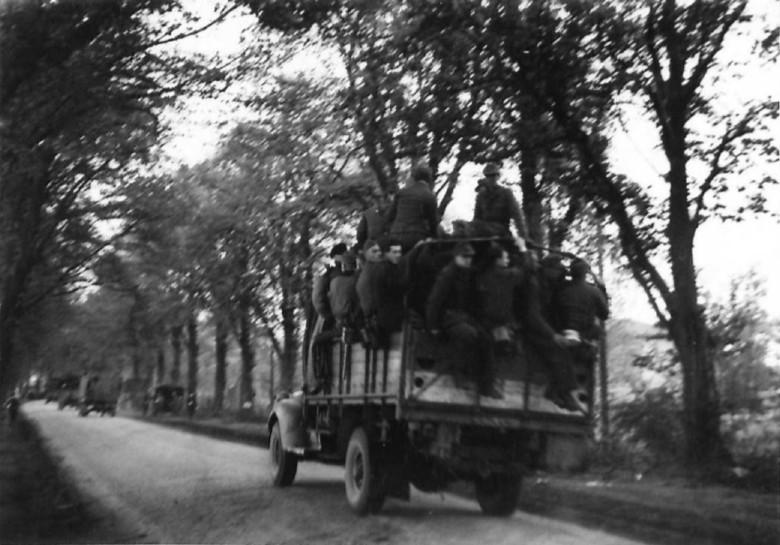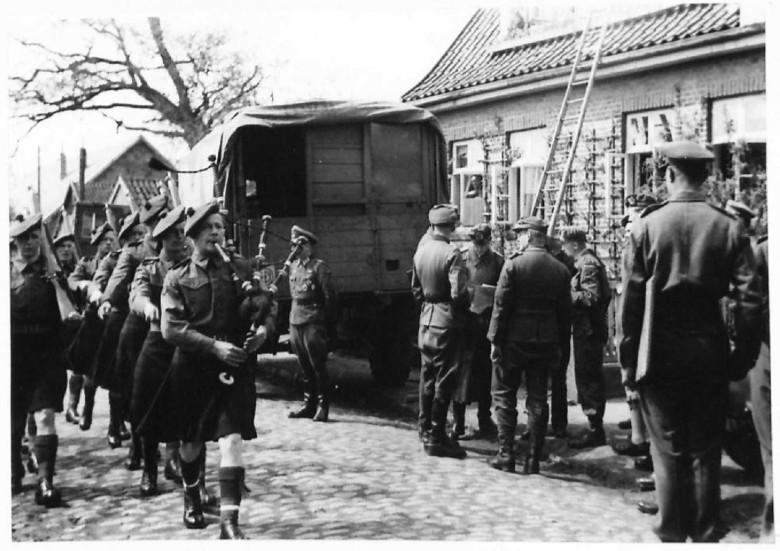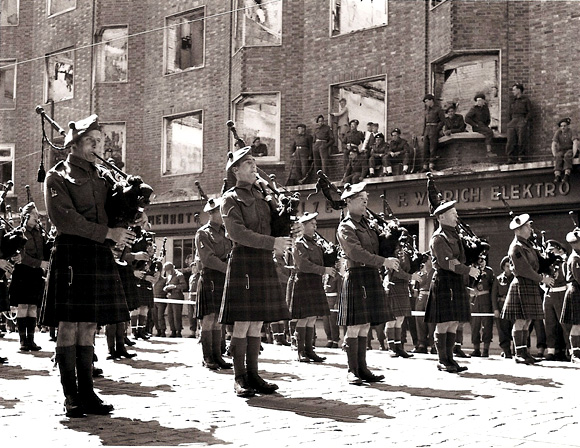Last days of the war for the 51st Highland Division and the German surrender
7-12 May 1945
An Extract from "The Story of the 51st Highland Division Signals - June 1944 to July 1945"
Here in the words of the Writer of the Intelligence Summary of the Division, published on the 7th May, is the story of the surrender on our front: -

German POW May 45
show infoDescription:
From the IWM Collection, with kind permission.
Caption reads "Lorry loads of German prisoners on their way to the cages."
Taken by Sgt. Johnson. 7.5.45. Occupation of Bremerhaven.
Copyright:
IWM BU 5577
Tags:
"When a patrol of our recce regiment moved down the road towards Ringstedt, 7452 on the morning of the 4th May, they were met by some 12 Germans whom they took PofW without difficulty. There then emerged a Major, thought at the time to be the Comd of Regt Lubeck, with his hands up and he was asked to surrender the village. This he said he was unable to do, since any surrender would have to be done at Divisional level.
He was then instructed to communicate with his division and initiate the proceedings. The Division's reply was to request that an Officer be sent to their HO to negotiate. This request was immediately refused and it was pointed out firmly that it was the role of the surrendering formation to provide the negotiator. A Major from the Divisional Artillery HO then appeared on the scene and made the same request, which was again turned down. Since, however, this seemed to be leading nowhere, Comd 154 Bde agreed that if the enemy sent a properly authorised Staff Officer from Divisional HO to his HO, he was prepared after this visit to send a Staff Officer to their HO to point out our requirements and give our answer to the enemy's proposals. The enemy agreed to this and some time later a Captain from HO 15th Panzer Division appeared. He was taken to HO 7th A&SH in Lintig 7657, where Comd 154 Bde informed him of the terms of unconditional surrender. The German Officer then answered that he knew that the terms as they stood would be inacceptable to his Comd, and asked to make some suggestions. The gist of his Comd's views was as follows.
15th PG Division, though considerably weakened, was still reasonably equipped and well-disciplined fighting formation which would sell its life dearly and was still a force to be reckoned with. Though fully aware of the major war situation and of our local strength, his Comd pointed out that if 15th PG Division continued to oppose our advance the struggle would be severe and would cost both sides heavy losses. Since this could in no way alter the ultimate outcome of the war, he was anxious to avoid this unnecessary bloodshed, but in return he considered that for several reasons he was entitled to request certain exceptions to be made in the terms of surrender. The reasons were largely based on the well-worn German theme of military honour and sentiment in warfare which has so often been the mainstay of German negotiators on the wrong side of the table, but is conspicuously absent when the boot is on the other foot. He stated that even the British wireless admitted that 15th PG was the only field formation still fighting as such on German soil, and secondly he drew attention to what he called the long and honourable association in warfare between 15th PG Division and 51st Highland Division.
On these grounds he put forward the suggestion that his Division be allowed to surrender as a formation and that they be given an area within our territory in which to assemble for disarmament and demobilisation. He also requested that the Division be employed as a formation on Police duties within Germany after the war and that the Officers be permitted to retain, their revolvers. Comd 154 Bde replied that the conditions of surrender were those laid down by the Supreme Commander and that neither of the latter requests could be considered in any way whatever. With regard to the question of the surrender as a formation, he replied after consultation with Comd 51st Highland Division that, provided Comd 15th PG Division agreed to the terms of unconditional surrender, it was thought possible that the surrender of 15th PG Division as a formation into a specified area for the purposes of completing their disbandment could be arranged, but that, when that was completed, no further responsibility as to their future fate could be undertaken.
This concluded this phase of the negotiations and it was agreed that to facilitate parleying, reps from both Divisions should remain in the village of Rinqstedt 7452 which was to become neutral territory and from which both sides would. withdraw their troops. It was furthermore agreed that the truce should continue until 2200 hrs by which time the emissary would return to the RV with his Comds answer. The German Offr then returned to his HO and Comd 154 Bde to his HO where he informed Comd 51st Highland Division of the position reached In the negotiations.
During dinner came the first intimation, in the form of a BBC announcement, of the coming surrender of all Field Marshal Busch's troops opposing 21st Army Group in NW Germany. No such warning was received through the proper military channels for some time afterwards, which naturally placed the negotiators in a slightly awkward position .
Meanwhile the German emissary had already returned to the RV where he Informed our representative that Comd 15th PG Division was unable to accept the terms of unconditional surrender, but that he would like to prolong the truce until the results were known of negotiations which were believed to be taking place between Field Marshal Montgomery and Admiral Fried¬burg. The Germans were, however, unaware of the announcement of the Army Group surrender, which was communicated to them. In view of this they were told that Comd 15 PG Division and the Comd of Corps EMS, or whoever commanded the entire peninsula, together with two Staff Offrs, would be required to present themselves at the RV at 1000 hrs the following day to be conducted to higher HO on this side to receive the orders of Comd 30 Corps, In order to permit them to lift mines or build a bridge where necessary, and to avoid unnecessary bloodshed, it was agreed that the truce would be extended to 0800 hrs when the general Cease Fire would take effect. The German Offr went back to his HO with this message and returned et about 0100 hrs to say that his Comd and the Corps Comd would present themselves at the RV as ordered,
Accordingly at 1035 hrs 5 May, Lieut-General Rasp, Comd Corps EMS and Major-General Roth, Comd 15th PG Division together with a Naval representative and several Staff Offrs and clerks arrived at this HO. This party was considerably in excess of the numbers ordered and Comd 51st Highland Division stated that he would only deal with General Rasp, his Chief ot Staff and one interpreter, and the remaining Offrs and other ranks were segregated in another room. In the presence of Comd 51st Highland Division, Comd 154 Bde and certain Staff Offrs, BGS 30 Corps then transmitted to the German Corps Comd the immediate orders of Comd 30 Corps.
General Rasp was put in comd of all armed forces in the peninsula, whether or not they were under his comd at the time of surrender. The surrender terms were those which were laid down for all formations by the Supreme Commander, of which the main points were as follows:
(a) All enemy forces would remain in situ under comd of their own Offrs for administration and discipline.
(b) All ranks would be immediately disarmed and arms, ammunition and military equipment would be collected and dumped in Regtl and Divisional areas under German guard.
(c) All mines, booby traps and road blocks were to be removed and made safe, and no further destructions demolitions or evacuation of troops or equipment were to be carried out.
(d) Full details of the enemy Order of Battle, Strengths and Dispositions down to Coy level, together with the location of all types of dumps, and all other information as required by HO 30 Corps would be furnished forthwith.
(e) Certain roads, bridges etc., on key routes would immediately be put in running order.

7th Argyll Pipers, German POW
show infoDescription:
Care of the IWM, with kind permission.
Caption reads "While British and German officers talk in the road, the pipes of the 7th Argyles' go swinging by."
Taken by Sgt. Johnson. 7.5.45. Occupation of Bremerhaven.
Copyright:
IWM BU 5565
Tags:
Generally speaking the Germans made no difficulty and seemed thoroughly co-operative, though General Rasp made a considerable effort to obtain permission for his Offrs to retain their small arms to enforce his orders amongst the miscellaneous troops previously not under his command. BGS 30 Corps refused this request and countered by pointing out that guards for dumps could perfectly well be armed with sticks, clubs and truncheons etc., while, if the General had no confidence in the reaction of some of the fresh troops put under his command, the answer was to disarm his own troops last. General Rasp was so favorably impressed by the excellence of this answer that, in true German military manner, he approved it heartily and appeared quite to overlook any inconvenience it might cause him. Shortly after this the meeting broke up and the German delegates were given three-quarters of an hour to confer among themselves as to how our requirements were going to be carried out. A few harsh orders were given and a bevy of Staff offrs, clerks and interpreters went into a huddle while the General regaled himself with a cigar in the doorway and gave the photographers another chance.
At the end of this period the room was again cleared for our Commanders and Staffs to return. The German Chief of Staff then raised the minimum of sensible questions which were duly answered, instructions were given for the meeting later in the day between Comd 30 Corps and General Rasp and the meeting broke up.
Thus was settled in a most fitting manner a score dating from 23rd October 1942, when the 51st Highland Division first participated in the struggle against the Deutsche Afrika Korps, and the old 15th Panzer Division which finally surrendered in Tunisia in May 1943. It is indeed satisfying that in May 1945, its successor should meet a similar fate at the hands of 30 Corps and ourselves."
As ordered the German Units in Corps Ems cleared the roads of mines and dumped their arms and equipment and on 8th May the Division moved to a concentration area in and amongst the German Units which it could require to administer and assist in their demobilisation. 152 Bde was at Bederkesa, 153 Bde in the town of Bremerhaven and 154 Bde in Bexhovede with Divisional HO at Schiffdorf, a little village just outside Bremerhaven.
It was a strange night, as our columns motored in, to see the huge numbers of German soldiers all in their billet areas still as formed Units, the huge dumps of weapons and stores, and the parks for vehicles of the Wer¬macht all of which just a few days ago had been employed against us.
All Signals in Corps Ems were put under command of the C.R. Signals who had to say what stores they were allowed to keep and what lines they should have so that they could have an adequate system of command. Section Officers within their areas were asked to ensure that German Signal equipment was dumped separately from other equipment and this was later gathered into one pool at Bremerhaven. No, Wireless Sets other than Receivers for Broadcast purposes were allowed to the German Signal Units but they were permitted to keep quite a fair quantity of line stores.
On 12th May 45, a Victory Parade was held at Bremerhaven, when detach¬ments on foot and in vehicles from the Division and 130 Bde which was. attached to us, marched past the Corps Commander Lt. General Horrocks, in the Main Square of the town. They were played past the saluting base by the Massed Pipe Bands of the Division. Major Henderson and Lieut J. McHutchon with a party of 30 men with CSM Fleming represented Signals from Divisional HO while with the HOs of the Bdes and Regiments marched men from the out sections. General MacMillan himself led the Division past and later was joined by his Brigadiers beside the Corps Comd. when their Bdes which they were leading had marched past.

Pipe band of the 51st, Bremerhaven
show infoDescription:
The pipe band of the 51st Highland Division play during the ceremony to mark the handover of Bremerhaven by British to American forces in Germany under allied occupation.
Copyright:
IWM BU 6560
Tags:
Division History References :
After a brief rest in Isselburg orders were received on the 3rd April for the 51st Highland Division to concentrate at Enschede. The Divisional advance from Enschede would be to Salzbergenm, Lingen, to Quakenbruck, Vetchta, Wildeshausen, Delmenhorst, Bremen and finally Bremerhaven. Germany was now collapsing...
